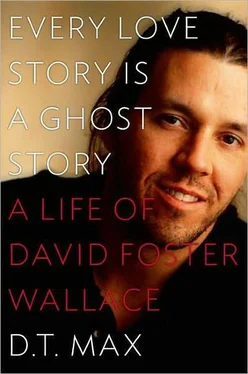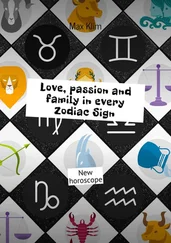Wallace returned to work. “I am both bogged down and forging ahead on the Project, if that’s coherent,” he wrote Franzen in September. “Word on the streets is that fall here is beautiful but very brief: snows swirl by Halloween.” He worried what winter would be like, though on the plus side his apartment was so small that his body heat or “at the very outside one space heater is apt to warm the whole facility.” To escape the town he had taken to calling “Drearacuse,” he sometimes drove to New York for the weekend and stayed with Costello. He would make an arrangement to meet a young woman for coffee and then, as Costello remembers, come back Sunday night and get his bag.
Other than women and his old friend, New York held little interest for Wallace. (“My whole nervous system seems to be on the outside of my body when I’m in NYC,” he would later protest to Alice Turner.) One exception was a community garden on Avenue B and 6th Street in the East Village, near where Costello lived. There a street sculptor was engaged in building a monument called the “Tower of Toys.” Homeless and barefoot, the sculptor would climb up and nail or attach yet one more plank or pole. While he watched the seemingly endless project, Wallace would complain to Costello about Karr.
In the spring of 1993 Wallace got an unexpected job offer. The English department at Illinois State University in Bloomington-Normal, about an hour from where he had grown up, was hiring. The school was an oddity, a large public college with an interest in avant-garde fiction. The English department ran something called the Unit for Contemporary Literature, 31under which auspices it hosted the Review of Contemporary Fiction and the Dalkey Archive Press, the publisher of Wittgenstein’s Mistress . When he had heard of the job opening, Steve Moore had contacted Wallace. Wallace had promised himself not to teach while he finished Infinite Jest , but he had been writing the manuscript steadily and successfully. So in bandana and boots, he went for a brief interview at the MLA conference in New York in December 1992. He was unusually self-confident, perhaps buoyed by a sense that Infinite Jest was on target. “You should know I am really really smart,” he told the English department members who met him. He sent a résumé with his publications and on the second page added entries for “REVIEWS IF ANYBODY CARES…” and “PRIZES &c (IF ANYBODY CARES…).” In February he flew to Illinois for two days of interviews and readings. To a small group of faculty and students he read the Don Gately crime scene and a section about Lyle, the guru who haunts the Enfield Academy weight room licking sweat off the players and dispensing advice in return. During a question-and-answer session, when a faculty member asked why they should hire him, he responded, “Who else?” Then the faculty committee went out with him to a local Chinese restaurant, where he told the department chair, Charlie Harris, a Barth expert, that Barth was dead.
By now the department was getting the idea that this was not the same author who had written Girl with Curious Hair, but they did not mind, it seemed. They found Wallace stunningly smart and committed. In “E Unibus Pluram,” Wallace quoted Emerson that once or twice in a lifetime one met a man who “carries the holiday in his eye.” Wallace seemed to them such a person.
Good as the visit was, Wallace still did not expect to get the job. “I alert you in advance,” he had joked in a note to Harris when he first applied, “that I am both caucasian and male.” The department was under pressure to hire more women, but everyone was deeply impressed with Wallace. They did not know what had happened in Arizona or Amherst or Boston, though Wallace’s fragmented teaching history must surely have suggested problems in the past. “What we wanted was the writer,” remembers Curtis White, a professor in the department who had helped organize the Unit for Contemporary Literature. “We hoped for the best on the rest of it.”
Wallace wanted the job as much as ISU seemed to want him to have it; he was ripe to go somewhere. He had been working at maximum speed. Fiction wasn’t the problem, for once. “Full-time writing is going OK volume-wise,” he wrote Debra Spark at the time, “but I find the isolation and lack of contact with people awfully hard to take.” He explained, “Things are sad here. Mary and I have agreed, not as amicably as one might wish, that we do not work as a couple…. We are both angry at one another, though in my case the anger’s just about been replaced by a very dark sadness. She was my best friend in the world, and we both gave up a lot and worked very hard to try to make this work.” One night Wallace tried to push Karr from a moving car. Soon afterward, he got so mad at her that he threw her coffee table at her. He sent her $100 for the remnants. She had a friend who was a lawyer write back to say she still owned the table, all he’d bought was the “brokenness.”
Portions of Infinite Jest were beginning to appear in literary magazines. “Three Protrusions,” the excerpt in which Ken Erdedy waits for his pot, had been the first in a widely read one, appearing in Grand Street in the spring of 1992. It was a virtuoso, voicy story, not dissimilar in style to Wallace’s earlier work. A year later, a more intriguing excerpt about Ennet House appeared in Conjunctions , in its “Unfinished Business” issue. Wallace wrote a preface assuring readers his would not remain so: “NYC guys in serious business suits have paid $ for something they’re legally entitled to by 1/1/94.” Aware that he had an opportunity to introduce a different David Foster Wallace, a writer with deeper goals and purer motivations, he continued:
Under fun’s new administration, writing fiction becomes a way to go deep inside yourself and illuminate precisely the stuff you don’t want to see or let anyone else see, and this stuff turns out (paradoxically) to be precisely the stuff all writers and readers everywhere share and respond to, feel. Fiction becomes a weird way to countenance yourself and to tell the truth instead of being a way to escape yourself or present yourself in a way you figure you will be maximally likable.
The fifty pages that followed were a kaleidoscope of first-person testimonials — stories of “hitting bottom”—lifted from Alcoholics Anonymous meetings, with rummies and meth heads taking over a fictional world where, since he began tearing through his senior thesis, no one had ever known pain deeper than a breakup before. Gately made his appearance too, another new kind of character for Wallace:
And that was the first night that cynical Gately willingly took the basic suggestion to get down on his big knees by his undersized Ennet House bunk and ask for help from something he still didn’t believe in, ask for his own sick spidered will to be taken from him and fumigated and squished.
The response to the Conjunctions publication was highly favorable. “Fun’s new administration” was finding Wallace readers. And as the Conjunctions excerpt appeared, Illinois State had written to offer Wallace a job that would lead to tenure. Wallace was thrilled, even more so when Charlie Harris agreed to let him teach just two classes a semester. The arrangement was so generous that Wallace immediately worried it wouldn’t last. He had visions of a replacement department head “upping it to three or four and you being in Burma or something” on sabbatical. Could he get, he asked Harris, kind of joking, a letter “preferably notarized by at least an appellate-level jurist” confirming the arrangement? Harris promised him it was forthcoming.
Despite, as he wrote to Don DeLillo, with whom he had struck up a correspondence with the encouragement of Franzen, “a certain icky sense about availing myself of academic patronage,” he felt he had made a good decision. 32It did not bother him overmuch that, as he wrote Washington, he would be “the least weird writer there.” He explained to Dale Peterson at Amherst, “The chairman is a dreamboat, everybody seems at once passionate and low-ego about teaching writing, and there was an utter absence of the Machiavellian politics that made Arizona such a gnarly place to be…. If I do not like teaching at ISU,” he explained, “I won’t like it anywhere, and I can retire from the field assured that I’ve experienced academia at its nicest.”
Читать дальше












